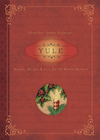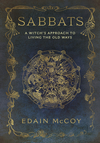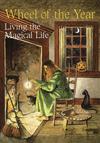Crafting Yuletide Cheer

The season of Yule can be a mixed blessing to Pagan parents. Many of the holiday festivities, school parties, and retail displays seem to be centered on the dominant culture. It might be a little difficult to explain to your children about our beliefs at this time of year, amidst the barrage of Santa Claus, shopping mania, and "Silent Night." The Goddess and the returning Sun King may seem to take a back seat to opening presents. However, this is one of the best times to involve your children in Earth-based spirituality. Many Christmas symbols really did come from Pagan traditions, and several legends including Santa and the reindeer can be traced to pre-Christian origins. Not only is this a wonderful opportunity to share the holiday customs of many faiths, we can also teach our children the meaning of our own Yule celebrations.
Llewellyn readers can find books with some excellent ideas for commemorating Yule. Dan and Pauline Campanelli's The Wheel of the Year and Edain McCoy’s Sabbats describe many meaningful rituals and fun crafts. Dorothy Morrison's Yule gives a detailed history of the holiday, as well as recipes, art projects, and spiritual ceremonies. This article is geared toward Pagan parents with small children, and intended to supplement these existing sources. You can explain many of our favorite traditions to the youngsters while involving them in related arts and crafts or allowing them to help you in the kitchen. Many of these ideas can be shared with non-Pagan friends and relatives, without causing offense.
That Jolly Old Elf
The legend of Santa Claus may be based on Saturn, an elderly white-bearded Roman god who was responsible for distributing gifts. Santa may have been modeled on Odin of the German, Icelandic, and Scandinavian pantheons. Santa's reindeer chariot might have come from the Finnish legend of Vainamoinen, who lived in the north, had a magical workshop, and wore a long white beard. If you feel comfortable divulging Santa's secret identity, you might want to teach your children about the "avatar" concept. An explanation we've found useful is: "You know how the priestess 'becomes' the Goddess in ritual? Mommy invokes the spirit of Santa Claus the same way." Our kids enjoy being the avatar of Santa themselves, choosing gifts for classmates or grandparents. You can explain Santa's history while creating these crafts:
- Paper Plate Santas
Materials: A plain paper plate, construction paper, cotton balls, glue, felt-tipped markers.
Method: Draw a jolly face on the paper plate. Give him a pointy red construction paper hat tipped with a cotton ball. Glue on more cotton balls for his beard, mustache, and "fur" at the base of his hat. - Santa Ornaments
Materials: Craft foam in red, white, and black, and pink or brown for his face; scissors or craft knife, strong glue, your child's school photo.
Method: Cut out a round pink or brown face. Add black eyes, a smiling red mouth, a white beard and mustache, and pointy hat. Cut out a larger round red belly. Glue on black buttons and white fur trim. Glue the two together, then glue your child's picture in the center of Santa's tummy. Now she is Santa's avatar. Glue a paper clip to the back, or punch a hole in the hat for a standard ornament hanger.
Trim a Yule Tree
If you have ornaments you'll need a tree to hang them on. Many families have an artificial tree, but you needn't feel guilty over buying a live evergreen. Here in Michigan, holiday trees are just another farm crop, like corn, planted and harvested yearly. The Yule tree tradition really does have Pagan roots. In Ireland and Cornwall, many trees were decorated near sacred wells year-round. In Norway, evergreens were brought into the house, but hung upside down from the rafters to save space!
You might want to decorate a tree outside for the birds. Smear peanut butter on pinecones and roll them in birdseed. Hang ears of field corn from pretty ribbons. String popcorn and cranberries. Attach a bell-shaped seed feeder to the top. During your child's winter break from school, get up early to watch all the feathered visitors enjoy your outdoor Yule tree.
- Sled Ornament:
Materials: Popsicle or craft sticks, glue, paint or felt markers, ribbon, scissors.
Method: Cut four craft sticks to 3 inches, two sticks to 3 1/4 inches, and two more to 3 inches. You'll need two more for "runners." Paint the craft sticks all one color, or two complimentary colors, like red and green. Place the two longest sticks flat in the middle, two shorter ones on either side, and the two shortest on the outside. Place two short sticks across them horizontally, one inch from the top and bottom, and glue them in place. You may wish to cut the top of the vertical sticks so they are rounded, to resemble a sled. When the glue has dried, turn your sled over and glue the runners in place on the bottom. Use a ribbon to hang the ornament. - Pipe Cleaner Ornaments
Materials: Red and white pipe cleaners for candy canes, other colors. Some craft stores sell neon and sparkly pipe cleaners, especially for crafts.
Method: Twist red and white pipe cleaners around each other to form a candy cane. Older kids can create bells, stars, angels, and fairies, or other Yuletide shapes. Pipe cleaners are also good to twist around holly and mistletoe sprigs. Caution: Real holly and mistletoe berries can be toxic to babies and pets. You might wish to use cloth holly leaves, found in most craft stores and holiday special sales. These ornaments can also be used to decorate wrapped gifts.
Magic Reindeer
Yule is a wonderful time to explain about the Horned Lord called Herne, Cerne, Cernunnos, or Boucca in western Europe. You might also wish to discuss the importance of deer and other wildlife in many cultures. The Navajo have a sacred deer kachina. Finnish and Lapp people still use reindeer as herd animals, for meat, fur, and milk. Folks in Bhutan, Mexico, and South America revere an entity much like Herne, who appears in sacred dances and dramatizations. In Abbots Bromley, England, reindeer antlers are used in a ritualized folk dance that has been presented for over nine hundred years. Of course, children in America love the tale of Santa's eight flying reindeer. You can make some of these crafts while singing about Rudolf and friends, or while an adult reads The Night Before Christmas aloud. (If you'd like, change the title to "Yule.")
- Clothespin Reindeer Ornament
Materials: Each ornament requires two old-fashioned clothespins, the kind without springs. Use commercial googly-eyes, and red pompoms for noses, or draw on their features with a marker. Red or green ribbons can adorn their necks or serve as hangers. Strong glue is needed to hold them together.
Method: One clothespin with the pins facing up makes the face and antlers, another clothespin with the pins facing down, glued to the back of the first, makes the body and legs. Add eyes, noses and ribbon. These can be pinned directly to the tree branches or used as decorations on a wrapped present. - Spoon Reindeer Ornament. This project is easy for smaller kids, as well as craft-impaired grownups.
Materials: A wooden spoon, brown pipe cleaners, googly eyes, pompoms, or paint.
Method: Make antlers out of the pipe cleaners, glue or tape them to the back of the spoon. Add eyes and a nose to the spoon bowl. You can also decorate your reindeer with ribbon, glitter glue, raffia, or other materials. - Reindeer Piñata. This is a craft for older children, although toddlers will have a great time squishing in the paste.
Materials: Newspaper strips, a balloon, paste made from flour and water, paint, googly-eyes, crepe paper or construction paper, paper towel rolls, ribbons, bowl, tape, scissors.
Method: Mix flour and water in a bowl to make a thin paste. Tear black and white newspaper into strips (no slick ads). Blow up a balloon, which you might want to balance on another bowl. Dip the newspaper strips into the paste and apply in layers to the balloon. Don't forget to leave a hole for the candy! Let it dry. Cut the paper towel rolls into antlers and tape or glue them onto one end. You can also use paper towel rolls for legs and a tail, if you wish. Paint the whole thing brown or tan. Again, let it dry. Using brown or tan construction or crepe paper, cut into strips, and make several parallel cuts along each edge to simulate fur. Glue these onto the deer's body. Give him googly-eyes and a pompom nose, or paint on his features. If you want, he can have ribbons to hang him up, or to adorn his antlers. Fill him with candy, tape the hole closed, save him for a tabletop decoration. or hang him up and have at it!
Yummy Yule Goodies
We enjoy many traditional holiday foods at this time of year, including gingerbread cookies, figgy pudding, roast goose, candy canes, and Wasshail. Your children may enjoy "wassailing the trees," a British and Germanic custom for blessing the spirits of the woods. Splash some apple cider at the base of each tree, while calling "to your health!"
- Cocoa to Go
This is a fun gift for a teacher or scout leader. Mix one cup cocoa powder, one cup dry milk, and one cup dry coffee creamer in a bowl. (Add more proportionally if you're making a big batch.) You can use flavored coffee creamer if it's something that tastes good with cocoa. If your brand of instant hot chocolate already has milk mixed into it, forgo the powdered milk and creamer. Add a few tablespoons of sugar, chocolate sprinkles, dry mini-marshmallows, and tiny peppermint candies. Mix well. Spoon the mixture into a zippered sandwich bag with Yule-themed decorations printed on the plastic. Stick a bow onto each bag. Viola, instant Yule presents. - Wassail
The original recipe includes alcohol, but you can make this beverage for kids and teetotaling adults using apple cider, red grape juice, orange juice, cinnamon, ground cloves (just a pinch), and ground nutmeg. You may wish to put the spices into a cloth bag and let it steep. Or push whole cloves into the skin of an orange, and let it float in a punch bowl. Experiment with proportions. Some folks like cranberry juice or allspice in the mix. This is a festive punch for a Sabbat party. - Divination Pudding
This is not a creamy milk-based dessert pudding; instead, this is a traditional English dinner pudding. You'll need about a loaf of stale bread, three eggs, a half cup of heavy cream, a quarter cup of brown sugar, and spices such as cinnamon, ground cloves, ground nutmeg, allspice, mace, and ginger. Pick two spices, and use no more than a quarter teaspoon of each. You will also need some trinkets such as small toy cars, rings, large coins like half-dollars, or other prizes. Grease a quart baking dish. Tear the bread into small pieces—children really enjoy doing this. Beat the eggs until stiff. Fold in the heavy cream and add the sugar and spices. Place the bread into the baking dish, pour the wet mixture over it. Now comes the fun part. Hide the prizes in the pudding. Let the kids push them down into the gooey bread, then cover them over. Bake your pudding in the oven for about 20 minutes at 350 degrees Fahrenheit, checking it frequently. (You might want to check a standard cookbook for a Yorkshire pudding recipe to find definite cooking temperatures. I cook with a wood stove, which has three temperatures: "hot," "hotter still," and "really honkin' hot." Bread pudding is best cooked at "fairly darn hot." Dorothy Morrison has some really good recipes in her Yule book, too.) The top should be golden brown and an inserted toothpick should come out clean. Serve hot, with butter and whipped cream. Caution: WARN people about the prizes, so that nobody chokes on them! You might want to make a separate pudding for toddlers, or use prizes that aren't small enough to swallow. The coins represent money, the cars mean a journey, and the rings signify love.
More Timely Traditions
Decorating with holly and ivy, lighting a Yule log, and commemorating the Goddess in her mother and crone or grandmother aspect are all delightful Pagan traditions. You can find representations of the crone Goddess in the form of Mrs. Claus and the good Scandinavian witch who brings candy and goodies. The Latvian people have a female elf who distributes presents. Besides the Virgin Mary and baby Jesus, other cultures revere a Mother Goddess who gives birth to a son representing light, including the Egyptian Isis and Horus, the Persian Asura and Mithras, and the Welsh Rhiannon and Pryderi.
Your children can honor the Goddess at this festive time of year by singing carols in a nursing home, or distributing goodies at a women's shelter. Many carols have Pagan overtones, such as "Deck the Halls" and "Here We Come a Wassailing." Others are religion-neutral, such as "Rudolph" and "Jingle Bells." A nice present for an elder: Wrap a new washcloth around a bar of non-scented soap. Tie it with a pretty ribbon. Stuff the whole thing into a soft bedroom slipper. Fill the other slipper with a shampoo bottle. Put the gift into a pre-decorated paper sack, tied with more ribbon. You might also want to help your youngsters choose gifts for the local kids' charity drive.
- Holly King and Oak King Staff
Materials: A dowel or long stick, cloth or paper leaves, pipe cleaners, tape or glue.
Each year, the holly king symbolically takes power at Yule, and rules until the Summer Solstice. Then the oak king takes over until the winter. If you wish to dramatize this event without an actual "fight," your children can remove last season's leaves from the staff and replace them with this season's symbol. Real leaves don't hold up well, and may be difficult to find out of season. Besides, cutting out construction paper leaves is half the fun. Use pipe cleaners, tape, or glue to attach them to the staff. You can also use pipe cleaners and cloth or paper leaves to make oak and holly crowns for a dramatization of the Oak and Holly Kings in ritual. - Yule Log
This is a genuinely older Pagan tradition, probably brought to England by the Saxons. If you don't have a fireplace, you can create a symbolic Yule Log for ritual or for your Solstice dinner table.
Materials: a large dry log, bark removed, electric drill with a wide-boring drill bit, votive candles in metal holders, cloth holly leaves, ribbon, pinecones, other decorations.
Method: With parents' supervision, drill three holes a few inches apart in the top of the log, large enough to fit the votive candles. Place the candles in the holes. Decorate around the outside of the log with ribbon, holly, pinecones and anything else that looks festive. You can use all one color—gold is lovely—or mix two or three colors. If you plan on using your log year after year, you may wish to paint it and glue the decorations on permanently. Caution: Make sure flammable decorations are far enough from the candle flames to be safe. Keep it out of reach of toddlers and pets. If you want to re-use your log as a bird feeder, screw a large eye-bolt into one end to hang it, drill more holes, and fill the holes with suet, peanut butter and seeds. - Moon and Star Mobile
Materials: Gold paper foil or gold paint, cardboard, yarn, string or ribbon, a coathanger, scissors, tape.
Method: Cut out moons, stars, and suns from the cardboard. This is a good opportunity to talk about recycling. Paint or glue paper foil onto the stars and moons to make them look heavenly. Glue or use clear tape to fasten the ribbon or yarn to each planet, then tie them to the hanger. This is another way to honor the Goddess as Queen of the Heavens, as Nimue, Artemis, or Diana the Lady of the Moon, or to enjoy Ariarhod's castle of stars. It's also a good time to discuss the sun "returning" at the Winter Solstice. - Festive Yule Wreath
This can symbolize the Wheel of the Year and the beauty of nature. Decorating with greenery was a Greco-Roman tradition that spread north into Europe. Because some trees never lost their leaves, they remind us of the promise of spring.
Materials: A wreath form or thick wire bent into a circle, the cutoff leftover greenery from the bottom of your Yule tree or commercial cloth evergreen garland, thin wire or bread ties, pinecones, nuts, craft birds, ribbon, bells, tiny gift boxes, seashells, or use your imagination! You can spray paint the pinecones, and nuts, and wrap the gift boxes, or leave them natural. Wire the evergreen boughs to the wreath frame. An advantage to commercial garland is sometimes it includes tiny electric lights. If so, be careful not to nick or expose the wires. Using bread ties, wire on the other decorations. Tie a festive ribbon around the top of the wreath. A ribbon with wire inside the cloth holds its shape well. This is a fun group project for a coven or a children's Yule party.
May you and your children enjoy a blessed, peaceful and merry Yule!
Related Products



is subject to certain Terms and Conditions